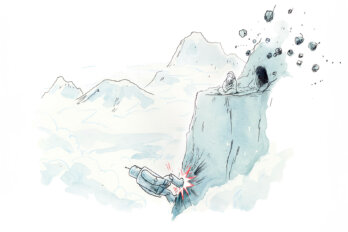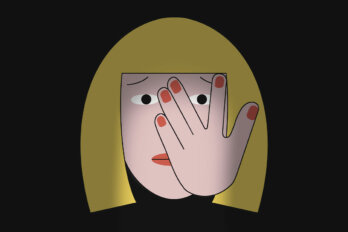With reference to “Minor Keys,” Moira Farr’s May 2008 article on music and depression, The Walrus asked several writers and music critics for a compilation of their “saddest ever” songs.
The following list is not meant to be in any sense definitive—that would be dense—but it is pretty damn sad. The only guideline for our panel: no nominations would be allowed for groups or artists whose default emotion is sadness. Which meant: no Jeff Buckley, no Joy Division, no Townes Van Zandt — and Radiohead? Forget about it.
Besides, Radiohead aren’t sad. They’re just miserable.
If you think we’ve left any out, be sure to comment and/or insult us below, with (most importantly) your own recommendations. We do hope you enjoy the list. In a manner of speaking.
Contributors: Bert Archer (Globe & Mail), Jared Bland (Walrus), Paul Isaacs (Eye Weekly), Jeremy Keehn (Walrus), Dave Morris (Eye Weekly), Sofi Papamarko (Exclaim), Peter Robins (Daily Telegraph), Jordan Timm (Maclean’s), Claire Ward (Walrus). Compiled by Paul Isaacs.
1. The Band, “Rockin’ Chair” (1969)
“We’re gonna soothe away the rest of our years
We’re gonna put away all of our tears
That big rockin’ chair won’t go nowhere”
Richard Manuel was blessed, one of the truest soul singers of any race or era until self-abuse ravaged his voice. His gifts never found a better showcase than in bandmate Robbie Robertson’s tender “Rockin’ Chair,” a highlight of The Band’s self-titled 1969 LP. Robertson’s words are those of an old sailor near the end of his life, pining for his Virginia home, the company of his best friend, and a rocking chair in which to sit and while away his last days, dipping snuff and shooting the breeze. The yearning in Manuel’s voice, and in The Band’s rich harmonies, is so finely tuned that it’s impossible to hear this song and not be put in mind of wherever or whomever it is that you’ve left behind. And if by some chance you’re lucky enough to find “Rockin’ Chair” coming over the speakers when you return to that place or that person, you’ll find it the sweetest song you ever did hear. Jordan Timm
2. Tom Waits, “Christmas Card from a Hooker in Minneapolis” (1978)
The success of “Christmas Card from a Hooker in Minneapolis” depends on the level of sympathy one is able to summon for a down-on-her-luck prostitute. In my case, that’s a lot, and so “Christmas Card” has always struck me as the booziest and saddest moment of Tom Waits’s boozy and sad Asylum records era. With its twist ending (you mean she hasn’t managed a miraculous recovery from beleaguered hookerdom?), it becomes about the lies we tell ourselves and each other, and few things are sadder than the reality that we tell a lot of both. (Bonus spin: the version available on the Sydney 1979 bootleg, in which Waits prefaces it with the chorus of “Silent Night”—as with the video above—makes it even sadder.) Jared Bland
3. Randy Newman, Marie (1968)
Randy Newman’s little dramatic monologues are given life by his command of old-fashioned pop-song convention. “Marie”, with its gentle melody and “I love you” chorus, sounds a sweet, sentimental thing until you notice the verses, in which a no-good man confesses all his failings in an abject tone that makes you both sure she should leave him and certain she won’t. The strings that begin to swell for “I’m drunk right now baby…” reach their romance-movie crescendo at “And when you’re in trouble/I turn away”. But he loves her, and he’ll always love her. There’s no hope. Peter Robins
4. Mary J Blige, “Not Gon’ Cry” (1996)
Mary J Blige is no Toni Braxton; she doesn’t want you to unbreak her heart, she wants to beat yours with a tire iron. But the queen of hip-hop soul is too classy for that, so instead of laying on the vocal histrionics that most R&B singers use to signify deep emotional turmoil, Blige coolly channels pure, steely determination (“you’re not worth my tears”)—and makes us do the crying for her. Dave Morris
BONUS SADNESS: Ghostface Killah feat. Mary J. Blige—All That I Got Is You
5. The Kinks, “Oklahoma USA” (1971)
“She walks to work but she’s still in a daze
She’s Rita Hayworth or Doris Day
And Errol Flynn’s gonna take her away”
Muswell Hillbillies, The Kinks’ 1971 state-of-the-nation address, was more specifically a song cycle exploring the gentrification of Muswell Hill, the working-class north London neighbourhood where band principal Ray Davies grew up. The album’s characters are traditional English types struggling to come to terms with technology, bureaucracy, and a rapidly changing and unfriendly 20th century. Its most affecting sketch comes near the end, in “Oklahoma U.S.A.” Atop a delicate piano melody, Davies offers a portrait of a woman living in decaying Industrial Revolution-era lodgings, surviving the drudgery of her working life only through her American movie-fuelled fantasies. The implication is that, like Mia Farrow’s Depression-era character in Woody Allen’s The Purple Rose of Cairo, or like the inner city Baltimore children in The Wire, Davies’s main character is trapped by circumstances so bleak and so beyond her control that she is unable even to imagine a way to improve her lot; she can only dream that a silver screen star like Errol Flynn will swoop in and save her. Meanwhile, her job awaits and her life drones on. JT
Next: Joni Mitchell, Patsy Cline, Kermit the Frog





